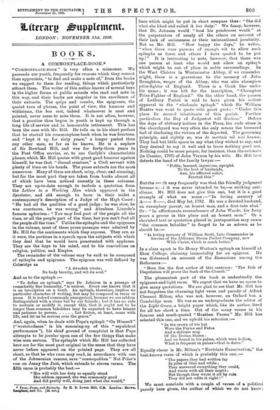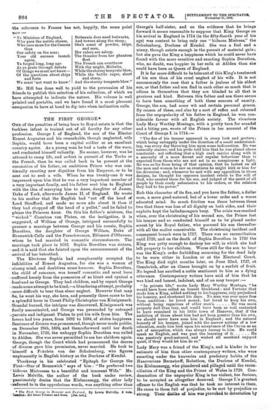BOOKS.
A COMMONPLACE-BOOK.*
" CommonmacE-Boon" is very often a misnomer. We persuade our youth, frequently for reasons which they cannot then appreciate, "to find and make a note of," from the books we suggest to them for reading, things which particularly attract them. The writer of this notice knows of several boys in the higher forms at public schools who read and note in this way, and their books sre singular in the excellence of their extracts. The quips and cranks, the epigrams, the quaint turn of phrase, the point of view, the humour and witticisms, the bon mot, indeed whatsoever is neat and pointed, never seem to miss them. It is not often, however, that a practice thus begun in youth is kept up through a long life of service and in honourable retirement. This has been the case with Mr. Hill. He tells us in his short preface that he started his commonplace-book when he was fourteen, and "kept it up for sixty years," a longer period than any other man, so far as he knows. He is a nephew of Sir Rowland Hill, and was for forty-three years in the Post Office service, or, to use Carlyle's characteristic phrase, which Mr. Hill quotes with great good humour against himself, he was that "dismal creature," a Civil servant with plenty of time on his hands. The prose extracts are the most numerous. Many of them are short, crisp, clear, and amusing; but for the most part they are taken from books almost all of which have been noticed recently in these columns. They are up-to-date enough to include a quotation from the Letters to a Working Man which appeared in the Spectator, and old enough to have in their midst a contemporary's description of a Judge of the High Court : "He had all the qualities of a good judge : he was slow, he was courteous, he was wrong," and Abraham Lincoln's famous aphorism "You may fool part of the people all the time, or all the people part of the time, but you can't fool all the people all the time." Unlike the epitaphs and the epigrams in the volume, most of these prose passages were admired by Mr. Hill for the sentiments which they express. They are, as it were, the portions in a speech upon the subjects with which they deal that he would have punctuated with applause. They are the keys to his mind, and to his convictions on religion, politics, and Empire.
The remainder of the volume may be said to be composed of epitaphs and epigrams. The epigram was well defiued by Coleridge as • Verse, Prose, and Epitaphs. By B. B. Lewin Hill, C.B. London: Brown, Langham, and Co. [2s. net.] "A dwarfish whole; Its body brevity, and wit its soul."
And as to the epitaph :-
"To define an epitaph," says Dr. Johnson in a passage of remarkably fine humanity, "is useless. Every one knows that it is an inscription on a tomb. An epitaph, therefore, implies no particular character of writing, but may be composed in verse or prose. It is indeed commonly panegyrical, because we are seldom distinguished with a stone but by our friends ; but it has no rule to restrain or mollify it, except this, that it ought not to be longer than common beholders may be expected to have leisure
and patience to peruse Let fiction, at least, cease with life, and let us be serious over the grave."
And, again, when he deals with Pope's epitaph "On Himself" ("wretchedness" is his summing-up of this "sepulchral performance "), his chief ground of complaint is that Pope attempts to be jocular upon one of the few things that make wise men serious. The epitaphb which Mr. Hill has collected here are for the most part original in the sense that they have never before appeared on the printed page. They are all short, so that he who runs may read, in accordance with one of the Johnsonian canons, save "cosmopolitan" Nat Prior's one on Jenny the Just, which extends to eleven verses. The fifth verse is probably the best :— " Her will with her duty so equally stood She seldom opposed, she was commonly good And did pretty well, doing just what she would," lines which might be put in short compass thus : "She did what she liked and called it her duty." We fancy, however, that Dr. Johnson would " hual his ponderous wrath" at the perpetrators of nearly all the others on account of their lack of seriousness or their unintentional jocularity. Not so Mr. Hill. "How happy the days," be writes, "when there were parsons of enough wit to allow such epitaphs as these and others I have quoted to be put up !" It is interesting to note, however, that there was one parson at least who would not allow an epitaph which might be out of place in noble surroundings. In
the West Cloister in Westminster Abbey, if we remember aright, there is a gravestone to the memory of John Broughton, verger of the Abbey, who was also champion prize-fighter of England. There is a blank line under his name ; it was left for the inscription, " Champion Prize-Fighter of England." On the other hand, the parson of Ledbury Parish is said to have given his ardent approval to the "wholesale epitaph" which Sir William Hunter was wont to quote with great gusto : "Under this place lie several inhabitants of this parish. Further particulars the Day of Judgment will disclose." Before the days of obituary notices in the Press, the rude stone in the churchyard was very often the only means the bereaved had of disclosing the virtues of the departed. The governing principle, and rightly so, was de snortuis nil nisi bonum. They had but little space to say what they wished to say, and they desired to say it well and to leave nothing good out.
Nothing could be more proper, for instance, than the estimate (in Chester, 1797) of John Vernon by his wife. Mr. Hill here detects the hand of the family lawyer :— "Polite, learned, ingenious, upright. To the best of husbands, Ann, his afflicted relict, Erected this."
But the req7dt very frequently was that the friendly judgment became w.a.it it was never intended to be,--a striking anti- climax. Mr. Hill does not give this one, but it is a good
example of what we mean :—" In loving memory of A— S—, died May 1st, 1782. He was a devoted husband, an exemplary parent, an honest man, and a first-rate shot." Or: "In affectionate remembrance of John Warde, for forty
years a grocer in this place and an honest man." Or a cherished text or quotation placed in juxtaposition may cause "the common beholder" to forget to be as solemn as he
should be :—
" In loving memory of William Scott, Late Commander in
Service of the Alderney Steam Packet Company, now With Christ, which is much better."
In a class apart is Sir Henry Wotton's epitaph on himself at Eton College, claiming immortality for an epigram. He
was distressed on account of the dissensions among the Reformers :-- "Here lies the first author of this sentence: The Itch of Disputation will prove the Scab of the Church."
The pleasantest part of the book is undoubtedly the epigrams and light verse. We regret that we have no space to give many quotations. We are glad to see that Mr. Hill has not forgotten the charming light verse and parody of Alfred Clement Hilton, who was not, however, an Oxford but a Cambridge man. He was as an undergraduate the editor of the Light Green, a bright paper which, like its author, lived for all too short a time. Out of the many verses in his
famous and much-quoted "Heathen Passee " Mr. Hill has selected this one, and we uphold his selection :—
" In the crown of his hat
Were the Furies and Fates And a delicate map Of the Dorian States : And we found in his palms, which were hollow,
What is frequent in palms—that is dates."
Equally clever is Mr. Hilton's "Noviciate Examination," the best-known verse of which is probably this one :— " The papers they had written lay In piles of blue and white ;
They answered everything they could, And wrote with all their mighti
But though they wrote it all by rote They did not write it right !"
We must conclude with a couple of verses of a political parody here given, the author of which we do not know;
the reference to France has now :— " Ye Ministers of England. Who pare the native cheese, Who care more for the Caucus than Our safety on the seas; Your old excuses launch again.
Ye forged long, long ago As ye prate through debate Of things we must not know— Of the questions about ships and forts We must 'not want to know.'
Mr. Hill has done well to yield to the persuasion of his friends to publish this selection of his collection, of which we have attempted to indicate the nature. His volume is well printed and portable, and we have found it a most pleasant 'companion to have at hand to dip into when inclination calls.
not, happily, the same point Britannia does need bulwarks, And towers along the steep; She's scant of powder, ships, and men, Her rulers are asleep.
The thunder from her phantom fleet The French can overthrow With thy might, Afelinite, While the stormy tempests blow, While the battle rages, short and sharp.
And the stormy tempests blow."

































































 Previous page
Previous page